 © European Union, 2025, CC BY 4.0 | Photographer: Dati Bendo, 30.08.2025 in Tallinn
https://frictions.europeamerica.de/wp-content/uploads/2025/10/P-067698_00-10_02-HIGH-612716.jpg
800
1200
Paul Vickers
https://frictions.europeamerica.de/wp-content/uploads/2020/08/LogoSCREA-RGB_engl-1030x229.png
Paul Vickers2025-10-01 22:37:282025-10-02 08:51:50The European Union’s Strategic Autonomy, Transatlantic Shifts and Ukraine
© European Union, 2025, CC BY 4.0 | Photographer: Dati Bendo, 30.08.2025 in Tallinn
https://frictions.europeamerica.de/wp-content/uploads/2025/10/P-067698_00-10_02-HIGH-612716.jpg
800
1200
Paul Vickers
https://frictions.europeamerica.de/wp-content/uploads/2020/08/LogoSCREA-RGB_engl-1030x229.png
Paul Vickers2025-10-01 22:37:282025-10-02 08:51:50The European Union’s Strategic Autonomy, Transatlantic Shifts and Ukraine © European Union, 2025, CC BY 4.0 | Photographer: Dati Bendo, 30.08.2025 in Tallinn
https://frictions.europeamerica.de/wp-content/uploads/2025/10/P-067698_00-10_02-HIGH-612716.jpg
800
1200
Paul Vickers
https://frictions.europeamerica.de/wp-content/uploads/2020/08/LogoSCREA-RGB_engl-1030x229.png
Paul Vickers2025-10-01 22:37:282025-10-02 08:51:50The European Union’s Strategic Autonomy, Transatlantic Shifts and Ukraine
© European Union, 2025, CC BY 4.0 | Photographer: Dati Bendo, 30.08.2025 in Tallinn
https://frictions.europeamerica.de/wp-content/uploads/2025/10/P-067698_00-10_02-HIGH-612716.jpg
800
1200
Paul Vickers
https://frictions.europeamerica.de/wp-content/uploads/2020/08/LogoSCREA-RGB_engl-1030x229.png
Paul Vickers2025-10-01 22:37:282025-10-02 08:51:50The European Union’s Strategic Autonomy, Transatlantic Shifts and Ukraine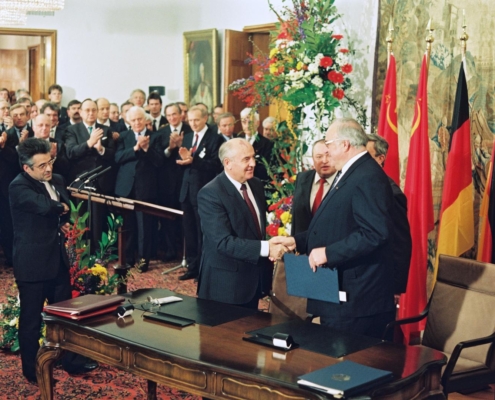
“Wendezeit”: Helmut Kohl, German Foreign Policy and the Dispute over NATO’s Eastern Enlargement
Lisa Marie Freitag explores Kohl and Germany navigated NATO enlargement, enabling Central and Eastern European countries to shape their fate while Russia manipulates recent history

Futures Thinking in Times of Crisis (Part I): Semiotic Pathways through Uncertainty
How can contested symbols shape our political imagination? Katarina Damčević explores futures thinking through the lens of semiotics and cultural crisis.
 Victoria Harms
Victoria HarmsOrigin Stories: Meritocracy, Exclusion & the History of Johns Hopkins University Reconsidered
How does the long history of JHU, America’s first research university, still shape the struggle over merit, access, and inclusion today?

Precarious Area Studies on the Prairie: Timothy Nunan at the University of Kansas
In a precarious era for international scholarship, Timothy Nunan discovers intellectual vitality, openness and historical turning points at the University of Kansas
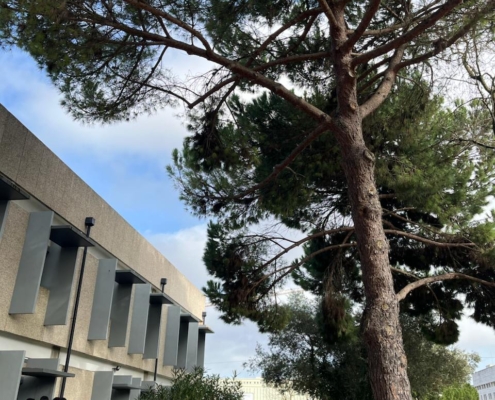
Geopolitics, Migrations and Identities in Central Eurasia: Reflections from the CESS-ESCAS Lisbon Conference 2025
How are shifting geopolitics, migration patterns, and identity transformations shaping Central Eurasia today? What significance do queer indentities, womne's experiences and artistic interventions have? Saltanat Shoshanova offering a glimpse into the future of Central Eurasian and Central Asian studies.
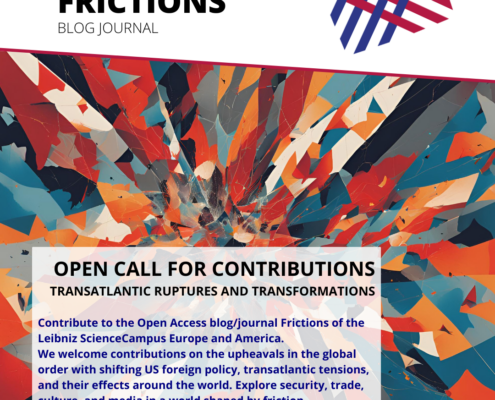
Open Call for Contributions: Transatlantic Ruptures and Transformations
Frictions welcomes contributions discussing the current disruptive, unpredictable role of the US in world politics today and its impact on other regions of the world. At the same time, we encourage reflections on other periods of regional and global upheaval that generated phenomena that are gaining resonance today.
 Press Service Of The President Of Ukraine. YPV.
Press Service Of The President Of Ukraine. YPV.Cowboy Diplomacy Reloaded: Trump’s reckless foreign policy and the shadow of Putin
Trump’s foreign policy fuels Putin’s agenda, blaming Ukraine for its own invasion while excusing Russian aggression. His admiration for strongmen and disregard for democratic alliances threaten global stability. This isn’t diplomacy, it’s a roadmap to authoritarian dominance via cowboy diplomacy, argues Chris Kostov.
 White House/ Public Domain
White House/ Public DomainFrom Europe and America to America (with Russia) against Europe? A Fascist in the White House and the emerging end of the Transatlantic alliance
In a hot take on the second Trump presidency, Ulf Brunnbauer sees a fundamental ideological shift in US foreign policy, away from democratic values and towards fascism combined with a Putin-style vision of the world.
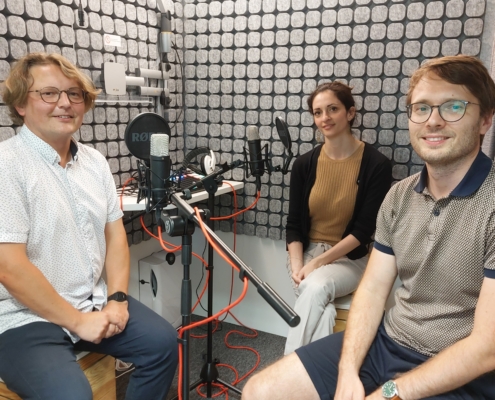
Bridges and Borders of Area Studies and International Relations. An interview with Jan Hornát & Mélanie Sadozaï
Jan Hornát and Mélanie Sadozaï discuss the intersections, complementarities, and frictions between area studies and international relations (IR), tracing the theoretical and empirical synergies that interdisciplinarity can generate
 IMAGO / Shotshop
IMAGO / ShotshopNavigating Polycrisis: The EU’s Challenges in Migration, Legitimacy, and Geopolitics. An interview with Ruth Ferrero-Turrión
Discover Ruth Ferrero-Turrión's insights on the EU's response to migration, legitimacy, and geopolitical challenges. Can the Union overcome its "polycrisis" and embrace a unified future?
 Mélanie Sadozaï
Mélanie Sadozaï Border Studies in 2024: Where are we now?
Mélanie Sadozaï examines how the 2024 LISER conference on "disruptive borderlands" highlighted borders as sites of both crisis and resilience, openness and restriction, urging a shift towards inclusive, cross-border cooperation in policy.
 © European Union, 2025, CC BY 4.0 | Photographer: Dati Bendo, 30.08.2025 in Tallinn
© European Union, 2025, CC BY 4.0 | Photographer: Dati Bendo, 30.08.2025 in TallinnThe European Union’s Strategic Autonomy, Transatlantic Shifts and Ukraine
Trump’s return to power means Europe faces a choice between strategic dependency and autonomous leadership, with Ukraine’s fate serving as the ultimate test of the EU’s geopolitical maturity, argues Oleksiy Kandyuk

“Wendezeit”: Helmut Kohl, German Foreign Policy and the Dispute over NATO’s Eastern Enlargement
Lisa Marie Freitag explores Kohl and Germany navigated NATO enlargement, enabling Central and Eastern European countries to shape their fate while Russia manipulates recent history
 Victoria Harms
Victoria HarmsOrigin Stories: Meritocracy, Exclusion & the History of Johns Hopkins University Reconsidered
How does the long history of JHU, America’s first research university, still shape the struggle over merit, access, and inclusion today?
 Highsmith, Carol M, photographer. A piece of the vast Great Sage Plain in Montezuma County in extreme southwestern Colorado. -05-28. Photograph. Retrieved from the Library of Congress,
Highsmith, Carol M, photographer. A piece of the vast Great Sage Plain in Montezuma County in extreme southwestern Colorado. -05-28. Photograph. Retrieved from the Library of Congress, Vast Early America: A Transcontinental Conversation
Markus J. Diepold explores how German American Studies can benefit from a stronger focus on Early American history, inspired by its vast scales and temporal depth.

Der Kollege von ‚drüben’: Gastwissenschaftler*innen an der Uni Regensburg im Kalten Krieg
Drawing from archival records, this essay explores visits by scholars from socialist states, providing insights into Regensburg University's role in knowledge transfer during the Cold War.

Lateinamerika und das östliche Europa. Ideen für historische Vergleiche
UR historian Klaus Buchenau reveals striking regional differences shaped by distinctive social and historical contexts in Latin America and Southeast Europe.
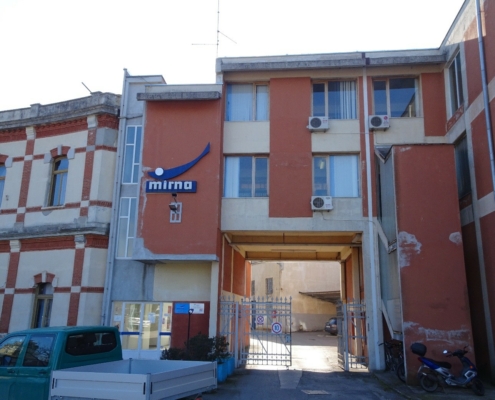 Ulf Brunnbauer
Ulf BrunnbauerCongealed Labor, Canned Fish: From the Adriatic towards a global history of the oil sardine
Ulf Brunnbauer takes us on a journey from the Adriatic to the Pacific, tracing the interconnections of human, environmental and animal actors who shape the global history of capitalism on multiple scales
 IMAGO / agefotostock
IMAGO / agefotostockTraditionen europäischer Sozialpolitiken und deren Nicht-Berücksichtigung am Ende des Kalten Krieges: Eine Spurensuche entlang von Arbeit und Gender
How were labour and social relations transformed at the end of the Cold War? What did neoliberal models and the effacement of progressive traditions mean for gender relations?
 IMAGO / Pixsell
IMAGO / PixsellStaatlichkeit und das Mantra des Exports im Jugoslawien der 1970er und 1980er Jahre: Wie der Schiffbau zum Kentern eines sozialistischen Staates beitrug
Was haben Schiffe und der Zerfall Jugoslawiens miteinander zu tun? Mehr als man glauben könnte, so argumentiert Ulf Brunnbauer
 IMAGO / alimdi
IMAGO / alimdiKicked out of Krapina (Croatia): Emigration Agents and Habsburg Bureaucrats
Was a kosher butcher with a US passport in small-town Croatia part of an international human trafficking ring? Or was he really enjoying the healthy waters? Ulf Brunnbauer explores a life story to consider migration, border and identity regimes in modern Europe and the Americas.
 IMAGO / Kolvenbach
IMAGO / KolvenbachOperation Barbarossa 2021: Practices (Re)Rendering the Myth of the ‘clean’ Wehrmacht in Contemporary Grand Strategy Computer Gaming
How does it feel to change history? Is it right to play out fantasies of Nazi-German military success? Jon Matlack explores how strategy-based computer games such as Hearts of Iron IV make this possible for millions of players and what this means for public history.
 IMAGO / ZUMA Wire
IMAGO / ZUMA WireThe Post-Dialogic Imagination: Brexit Friction, Brexit Fiction
Dirk Wiemann explores recent British fiction, including the works of Jonathan Coe and Ali Smith, to consider how novels have approached Brexit and its impact on the ability to conduct dialogue and form national imaginaries. Adopting a Bakhtinian lens, he considers the ways novels negotiate the polarized agonism that threatens to undo social cohesion with models of meaning-making rendered ineffective in new conditions.

Futures Thinking in Times of Crisis (Part I): Semiotic Pathways through Uncertainty
How can contested symbols shape our political imagination? Katarina Damčević explores futures thinking through the lens of semiotics and cultural crisis.

Precarious Area Studies on the Prairie: Timothy Nunan at the University of Kansas
In a precarious era for international scholarship, Timothy Nunan discovers intellectual vitality, openness and historical turning points at the University of Kansas

Geopolitics, Migrations and Identities in Central Eurasia: Reflections from the CESS-ESCAS Lisbon Conference 2025
How are shifting geopolitics, migration patterns, and identity transformations shaping Central Eurasia today? What significance do queer indentities, womne's experiences and artistic interventions have? Saltanat Shoshanova offering a glimpse into the future of Central Eurasian and Central Asian studies.

Open Call for Contributions: Transatlantic Ruptures and Transformations
Frictions welcomes contributions discussing the current disruptive, unpredictable role of the US in world politics today and its impact on other regions of the world. At the same time, we encourage reflections on other periods of regional and global upheaval that generated phenomena that are gaining resonance today.

Intentionale Toleranz? Ein kritischer Kommentar zur Bedeutung frühneuzeitlicher Religionsfrieden in Europa
Were early modern religious peace treaties milestones of tolerance or political compromises that left tensions open and power structures in place? Insights from Miriam Mähner's prize-winning Master's thesis reveal more

International Business from East to West: Shifting perspectives. Ten years of the Central and Eastern European Chapter in the Academy of International Management
This piece considers how turning to Central and Eastern European firms can encourage rethinking traditional theories of international business, including divisions of emerging and developed markets.

Exploring Far-Right Shadows: Navigating disturbing archival material in California and Virginia
Our ScienceCampus doctoral researcher reflects on researching archives on the far-right in the US, presenting the ethical and methodological challenges alongside practical solutions for maintaining mental wellbeing.

The University of Toronto Under Sur/Sous/Subveillance
The author traces the lasting impact of Canadian Media Theory to develop a virtual topography of the University of Toronto.
 IMAGO / Pond5 Images
IMAGO / Pond5 ImagesTurning Points, Hidden Treasures and Touchdowns: One month in Ann Arbor
UR historian Timothy Nunan reflects on a month in Ann Arbor and how it enriched his research on Shi’a Islamist transformations of the world in the late 1970s.

2nd Graduate Workshop 2023 Report | Competing Sovereignties: Intertwinement, Contestation, Evolution
Learn more about the multiscalar and reflexive approaches to the contested concept of sovereignty developed in this 2021 workshop
 Igor Stipić / poster based on creative commons images
Igor Stipić / poster based on creative commons imagesPeople from the Land: A High school story of the Mapuche Indigenous people in Chile
How are radical high school protests, environmental extractivism and indigenous identities entangled in Chile? Igor Stipić offers insights based on his ethnographic research
 Melanie Hussinger
Melanie HussingerPhoto Essay | Herbst der Erinnerung. Partizipatives Gedenken an den Großen Terror | The Autumn of Memory: Participatory Remembrance of the Great Terror (Moscow, October 2021)
How did participatory remembrance of the Great Terror, from family memory to civil society endeavours, fit in Moscow's urban and mnemonic landscape shortly before the war against Ukraine? This photo essay offers moving insights
 Press Service Of The President Of Ukraine. YPV.
Press Service Of The President Of Ukraine. YPV.Cowboy Diplomacy Reloaded: Trump’s reckless foreign policy and the shadow of Putin
Trump’s foreign policy fuels Putin’s agenda, blaming Ukraine for its own invasion while excusing Russian aggression. His admiration for strongmen and disregard for democratic alliances threaten global stability. This isn’t diplomacy, it’s a roadmap to authoritarian dominance via cowboy diplomacy, argues Chris Kostov.
 White House/ Public Domain
White House/ Public DomainFrom Europe and America to America (with Russia) against Europe? A Fascist in the White House and the emerging end of the Transatlantic alliance
In a hot take on the second Trump presidency, Ulf Brunnbauer sees a fundamental ideological shift in US foreign policy, away from democratic values and towards fascism combined with a Putin-style vision of the world.

Bridges and Borders of Area Studies and International Relations. An interview with Jan Hornát & Mélanie Sadozaï
Jan Hornát and Mélanie Sadozaï discuss the intersections, complementarities, and frictions between area studies and international relations (IR), tracing the theoretical and empirical synergies that interdisciplinarity can generate
 IMAGO / Shotshop
IMAGO / ShotshopNavigating Polycrisis: The EU’s Challenges in Migration, Legitimacy, and Geopolitics. An interview with Ruth Ferrero-Turrión
Discover Ruth Ferrero-Turrión's insights on the EU's response to migration, legitimacy, and geopolitical challenges. Can the Union overcome its "polycrisis" and embrace a unified future?
 Mélanie Sadozaï
Mélanie Sadozaï Border Studies in 2024: Where are we now?
Mélanie Sadozaï examines how the 2024 LISER conference on "disruptive borderlands" highlighted borders as sites of both crisis and resilience, openness and restriction, urging a shift towards inclusive, cross-border cooperation in policy.
 Julia Dragan/UR
Julia Dragan/UR The Return of Narratives | Conference Report: Crisis Narratives and the Pandemic
What can multiscalar area studies tell us about the impact of the COVID-19 pandemic around the world? Read more in this report
 Leon Wyczółkowski, Public domain, via Wikimedia Commons
Leon Wyczółkowski, Public domain, via Wikimedia CommonsSilent Rebels and the Resurrection of the Polish Nation | Exhibition analysis by Kathleen Wroblewski
Part of the Law and Justice (PiS) government’s soft power agenda, this recent exhibition features artworks that could undermine its efforts to promote a singular, martyrdom-focused politics of history and national identity.
 Mediabanco Agencia - Debate Anatel 15 11 2021; CC BY 2.0
Mediabanco Agencia - Debate Anatel 15 11 2021; CC BY 2.0Current Debates | Igor Stipić: Changing Chile’s Historical Cycle or Radical Comprises?
Will “the cradle of neoliberalism” also become its grave, as the new President of Chile promises? Igor Stipić, doctoral researcher at the Leibniz ScienceCampus, explores the radical compromises Gabriel Borić might need to make as he seeks to guide a society marked by a decade of protests towards democratic stability and fairness.

Workshop Report | Narrated Lives, Remembered Selves: Emerging Research in Life Writing Studies
How are life writing studies positioned in relation to the spatial, transnational and global turns in cultural studies and area studies? Tamara Heger and Verena Baier discuss these questions in their workshop report.
/
in: Current Debates
/
by: Drivalda Delia, Frederik Lange, Daniela Mathuber, Thalia Prokopiou, Eva-Maria Walther, Vita Zelenska
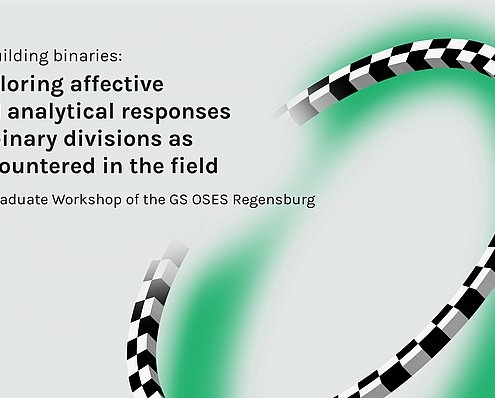
Impressions from the Workshop “Unbuilding binaries: Exploring affective and analytical responses to binary divisions as encountered in the field”
How can binaries be effectively unbuilt? How does this impact constructions of identity, conceptual frameworks and scholarly fields? These are some questions explored by the graduate researcher team behind the workshop “Unbuilding binaries”
 Rorschach, Anna Habaschy aka Minaechx, Wien 2020 (www.minaechx.at)
Rorschach, Anna Habaschy aka Minaechx, Wien 2020 (www.minaechx.at)Deutschland-Analysen: seeing Germany from inside and outside. An interview with Marcus Hahn and Frederic Ponten by Tamara Heger
Must Germany be studied as a nation-state? Or could it be viewed as an area, through lenses positioned on the inside and outside? How does the Nazi past affect the analytical and conceptual frameworks open to researchers today? Marcus Hahn and Frederic Ponten discuss their efforts to reconfigure German studies as transregional or trans-imperial area studies with Tamara Heger.
 IMAGO / agefotostock
IMAGO / agefotostockWe will be alright. Some encouragement for those in the starting gates and those who will be
In this thought-provoking text, Jana Stöxen reflects on her experiences of developing her research topic for her master's thesis. She explores the social, disciplinary and material barriers she faced before outlining how she overcame them to produce an innovative piece of research. Her words offer encouragement to her peers - and others - who might be struggling with similar challenges.
Imprint
Frictions: Europe, America and Global Transformations – Blogjournal Editorial Office
Department for Interdisciplinary and Multiscalar Area Studies (DIMAS)
Universität Regensburg
Universitätsstr. 31
93053 Regensburg
Telefon: +49 941 943 5964
Fax: (++49 941) 943 54 27
frictions@europeamerica.de
frictions.europeamerica.de
